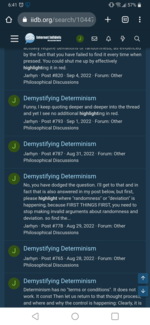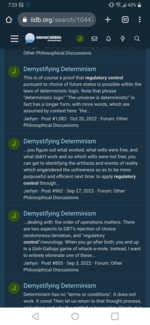Marvin Edwards
Veteran Member
If it was "the system at large" that chose to order the Salad, why did the waiter bring the dinner bill to me?
I said to the waiter, "I will have the Salad, please". The waiter brought me the salad and the bill.
The waiter did not bring the salad or the bill to "the system at large", because your theory that it is not me, but "the system at large" that ordered the salad is meaningless and irrelevant.
That's the point.
Yes. And it is precisely because we lack that foresight into the future that we humans evolved the notion of "possibilities", things that "might" happen and things that we "can" do.
If we knew in advance what was "determined" to happen then words like "options" or things that "can" happen would be unnecessary.
In the restaurant, we don't even know what we will order until we open the menu, see the many things that we "can" order, and decide what we "will" order. That's the whole point of the context of "possibilities", to give us the freedom to evaluate our options, and choose from among the many things that we "can" order the single thing that we "will" order.
Of course. Someone with omniscience like God, Laplace's Daemon, or the guy's wife, could predict what he would order before he knew himself. But he will never know himself until he finishes making up his mind.
Like I said at the outset, the waiter knows exactly what I ordered because I already told him. He does not bring the salad or the bill to "the system at large". He brings the bill to me, because it was I, and not "the system at large", that ordered the salad.
I am the one responsible for the bill because I am the one that ordered the salad. That's how both free will and responsibility work.
Professor Taylor is wrong on both counts. First, it matters a hell of a lot whether we make the choice for ourselves or if an "ingenious physiologist" tampered with our brain. Tampering with a person's brain to control their decisions is clearly an undue influence! Second, my hereditary proclivities happen to be integral parts of who and what I am. Whatever they lead me to choose, I have chosen. They are not an undue influence.
Your outline above was a detour taken to avoid the question on the table. How is the waiter, or anyone else, supposed to hold "the system at large" responsible for my dinner order? Your proposition that we shift the responsibility from me to "the system at large" is totally unworkable.
The decision will be causally necessary from any prior point in time. I will decide to order the Salad, even though it was also possible to order the Steak.
And, I will be held responsible for that choice when the waiter brings me the dinner bill. None of the other items you listed will be held responsible for my choice. After all, I still made that choice of my own free will, even though it was causally necessary that I would do so. Causal necessity never picks up the check for dinner. So, we should stop pretending that it will.
Geez, talk about wordplay! Decision making IS choosing! If it is deterministically entailed that decision making will happen, then there is no getting around us choosing.
If it is deterministically entailed that we will be making that choice while free of coercion and undue influence, then it is entailed that our choice will be freely chosen and freely willed. Again, there is no getting around choosing happening exactly as it does happen.
Free will is a deterministic event. It is not free of causal necessity/inevitability, but it is free of coercion and undue influence. And those are the only things that free will cares about.
There is no need to be free of causal necessity/inevitability, because it is not a meaningful or relevant constraint. It is exactly identical to us just being us, doing what we choose to do. It changes nothing.
Because the waiter has no idea of what is going to be ordered.
I said to the waiter, "I will have the Salad, please". The waiter brought me the salad and the bill.
The waiter did not bring the salad or the bill to "the system at large", because your theory that it is not me, but "the system at large" that ordered the salad is meaningless and irrelevant.
That's the point.
We don't have the necessary information to predict future events with any great accuracy. ...
Yes. And it is precisely because we lack that foresight into the future that we humans evolved the notion of "possibilities", things that "might" happen and things that we "can" do.
If we knew in advance what was "determined" to happen then words like "options" or things that "can" happen would be unnecessary.
In the restaurant, we don't even know what we will order until we open the menu, see the many things that we "can" order, and decide what we "will" order. That's the whole point of the context of "possibilities", to give us the freedom to evaluate our options, and choose from among the many things that we "can" order the single thing that we "will" order.
You can probably fairly accurately predict what close associates or your partner will order because you know them well. Some who are very close can finish each other's sentences or voice their partner's thoughts and feelings. Identical twins, etc.
Of course. Someone with omniscience like God, Laplace's Daemon, or the guy's wife, could predict what he would order before he knew himself. But he will never know himself until he finishes making up his mind.
But the waiter has no such privileged information, nor does the management of the restaurant. They just cater to a wide range of tastes and proclivities.
Like I said at the outset, the waiter knows exactly what I ordered because I already told him. He does not bring the salad or the bill to "the system at large". He brings the bill to me, because it was I, and not "the system at large", that ordered the salad.
I am the one responsible for the bill because I am the one that ordered the salad. That's how both free will and responsibility work.
Proclivities:
''It is unimportant whether one's resolutions and preferences occur because an ''ingenious physiologist' has tampered with one's brain, whether they result from narcotics addiction, from 'hereditary factor, or indeed from nothing at all.' Ultimately the agent has no control over his cognitive states.
So even if the agent has strength, skill, endurance, opportunity, implements, and knowledge enough to engage in a variety of enterprises, still he lacks mastery over his basic attitudes and the decisions they produce. After all, we do not have occasion to choose our dominant proclivities.' - Prof. Richard Taylor -Metaphysics.
Professor Taylor is wrong on both counts. First, it matters a hell of a lot whether we make the choice for ourselves or if an "ingenious physiologist" tampered with our brain. Tampering with a person's brain to control their decisions is clearly an undue influence! Second, my hereditary proclivities happen to be integral parts of who and what I am. Whatever they lead me to choose, I have chosen. They are not an undue influence.
The problem with your assertion is that it contradicts the facts. The waiter saw me reading the menu. The waiter heard me say, "I will have the Chef Salad, please".
That doesn't relate to what I said. Check my outline above. I've said it before.
Your outline above was a detour taken to avoid the question on the table. How is the waiter, or anyone else, supposed to hold "the system at large" responsible for my dinner order? Your proposition that we shift the responsibility from me to "the system at large" is totally unworkable.
Do you wish to claim that the waiter is having an illusion?
Are you suggesting that the bill for my dinner should be paid by "the system at large"? If so, then how would that be done?
That still misses the point. The system at large is the world, the nation, the culture of nation, its cuisine, cafe's restaurants, menus, the town you live the restaurant you go to, the proclivities of its customers, Indian, Asian, Italian, Greek, etc, etc. Countless different preferences being catered for, yet given determinism.....you guessed it: in any given instance that a decision is made, ...
The decision will be causally necessary from any prior point in time. I will decide to order the Salad, even though it was also possible to order the Steak.
And, I will be held responsible for that choice when the waiter brings me the dinner bill. None of the other items you listed will be held responsible for my choice. After all, I still made that choice of my own free will, even though it was causally necessary that I would do so. Causal necessity never picks up the check for dinner. So, we should stop pretending that it will.
Hence decision making within a deterministic system is not choosing, rather, a process of entailment.
Geez, talk about wordplay! Decision making IS choosing! If it is deterministically entailed that decision making will happen, then there is no getting around us choosing.
Decisions are entailed, not freely chosen or freely willed.
If it is deterministically entailed that we will be making that choice while free of coercion and undue influence, then it is entailed that our choice will be freely chosen and freely willed. Again, there is no getting around choosing happening exactly as it does happen.
Free will is a deterministic event. It is not free of causal necessity/inevitability, but it is free of coercion and undue influence. And those are the only things that free will cares about.
There is no need to be free of causal necessity/inevitability, because it is not a meaningful or relevant constraint. It is exactly identical to us just being us, doing what we choose to do. It changes nothing.



